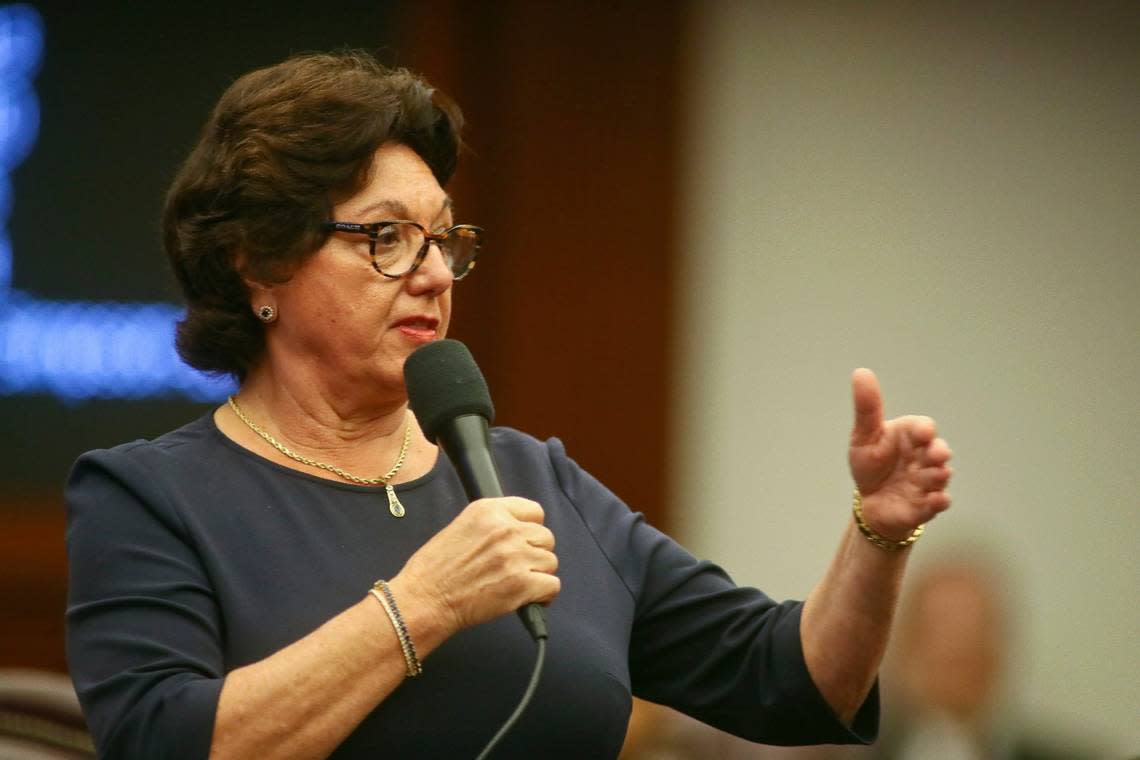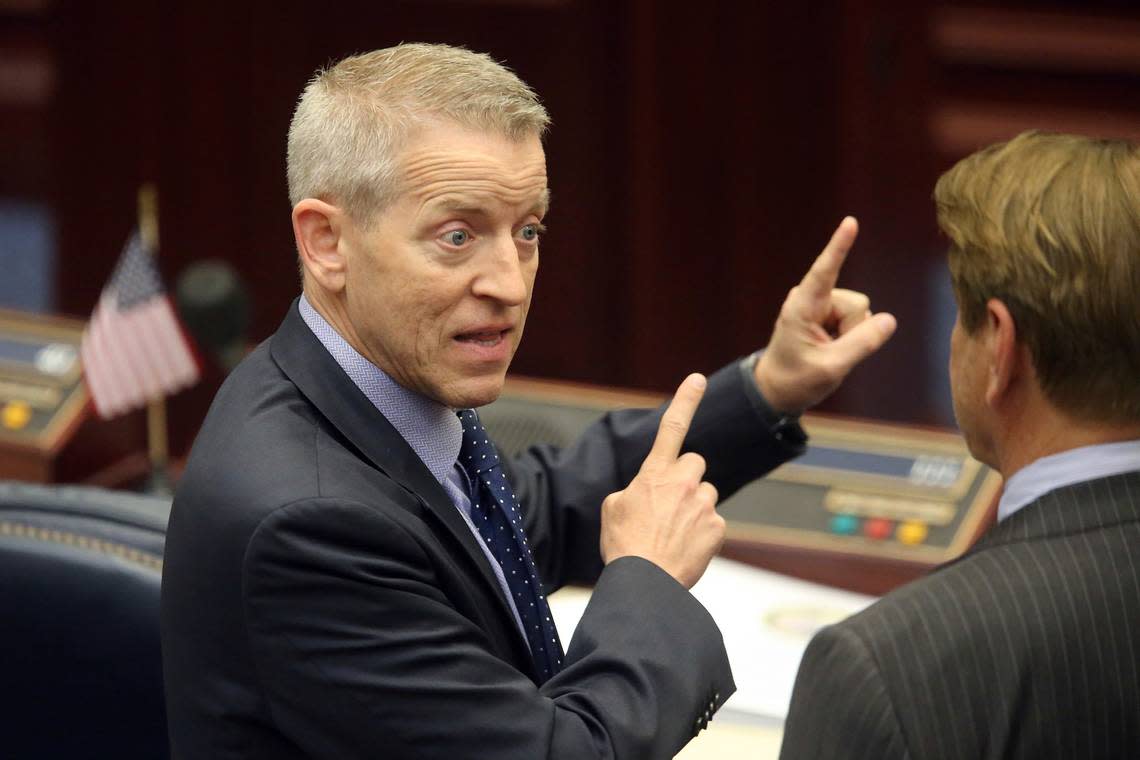New legislative leaders talk about abortion, housing and not being a ‘check’ on DeSantis
What will a Florida under Gov. Ron DeSantis and a Legislature with a Republican supermajority look like for the next two years?
Florida’s legislative leaders who will be sworn in on Nov. 22 say they’re planning an agenda of abortion limits, school reforms and tax breaks for housing, but they don’t expect to push back on the governor.
The one-party rule gives legislative leaders the power to hamstring Democrats and their efforts to erect hurdles to the Republican agenda. Republicans in both the state House and Senate may now use their supermajority of votes in each chamber to waive the rules of the lawmaking process, approve last-minute amendments and limit not only transparency but debate.
But they also have the power to override a veto of the governor, if they choose to object to his check on their power.

According to interviews with incoming Senate President Kathleen Passidomo of Naples and House Speaker Paul Renner of Palm Coast, that’s unlikely. Neither of them see their job as serving as a check on the governor but instead serving as “collaborator.”
Here are excerpts of their exclusive, separate interviews with the Miami Herald and Tampa Bay Times in which they discuss abortion, guns, insurance, housing costs, wokeness and the governor. (Questions and answers have been edited, and some paraphrasing used, for brevity.)

▪ Q: How do you see the role of the Legislature, a check on the executive branch or a rubber stamp for DeSantis?
Passidomo: “I’ve had numerous conversations with the governor about various issues. We agree on so many levels. So I don’t look at this as either the governor telling us what to do or us telling him what to do, but I think we’re going to have a collaborative two years...I don’t look at it as us versus them.
“We’ve spent a lot of time this summer with the staff in the governor’s office talking about initiatives that he wants to undertake and that we want to undertake, and we align in so many ways. So I feel very confident that we’re going to have a good two years of good policy and meaningful policy.”
Renner: “I agree with the governor. We have a very, very similar philosophical view of things on really every issue, and so I can’t be a check on my own opinions. And so I share those opinions. But there is a process. It’s not easy to pass legislation even when you’re in control.
“The judiciary provides the checks on the executive branch. There have been instances where the courts haven’t seen our way whether it’s legislative action, or some action by the governor. And that’s all healthy for our democracy...The greatest check and balance at the end of that is an election, and voters gave us a resounding endorsement.”
Housing tax breaks
▪ Q: What will be your priorities?
Passidomo: “My number one priority is [addressing] the lack of safe, affordable housing for the workers in our state. I’ve been working all summer on a robust, affordable housing bill that we internally have called Live Local, because we have so many families, particularly young workers that have young families, that have to travel sometimes an hour, an hour and a half to get to work, and that just disrupts home life.”
Her plan is to develop rental housing for middle-income workers using creative solutions, such as repurposing vacant strip malls, and mixed-use communities. Solutions include tax incentives for developers to build units at affordable rates. Some of the incentives could include tax rebates or tax reductions to encourage developers to build at more affordable rates.
“‘I would not support rent-control measures and the like on private businesses, but what I do support is incentivizing private businesses to provide this type of housing through tax rebates and the like.”
Another priority is the expansion of the Florida Wildlife Corridor, where she wants the state to build a bike path.
Renner: ”We obviously have hurricane recovery to deal with but, beyond that, a larger challenge I think is on everyone’s mind is what are we going to do about the cost of living? Is there anything we can do at the state level to help people? Whether that’s in the form of tax relief, that we’ve partnered with the governor on, or addressing the increases in insurance premiums that are happening throughout the state? The upcoming special session on insurance is one place where we can begin to address that. It won’t happen overnight.”
He is also focused on affordable housing: “...Making sure as much as we can, that we do what we can to bring down the cost of housing for everyone in Florida.” Options include extending the homestead exemption and expediting the availability of housing stock.
“What we can do is look at whether we can get some relief in the area of taxes that everybody pays if you’re a homeowner, as well as homeowners [insurance] premiums.
▪ Q: What is the game plan on the special session on property insurance?
Renner: He said the special session will look at consumer protection, mitigation and resilience “in a very comprehensive way that can do things to long term bring down the cost.”
“I do not believe that even if we accomplish everything we want to in the special session that we’re going to see any kind of immediate reduction in premiums, and I think it’s important to say that honestly to the people up front. But what we will do is address concerns about the stability in the insurance market, about the capacity we have in the market for private insurance to be here and not be dumping everyone into Citizens policies, which put the taxpayers on the hook and put them at risk if there’s a large storm that comes through the state of Florida.
“There’s still things that make Florida not attractive [for insurers to operate here]. And it’s not just the fact that we have storms. Insurers will tell you that they can adjust for that, but I think we need to ferret out some of the mischief and some of the gamesmanship that has happened and is driving up the cost of claims.”
“If you give people the opportunity to rebuild, and build stronger when they do so, then over time that will also help our situation because we’ll have homes that are better equipped to withstand the storms of the future.”
▪ Q: Should homes be rebuilt in the areas where there was flooding and devastation from Hurricane Ian?
Passidomo: “When you look at the devastation that we have here, the older homes, like mine, were the ones that got flooded. Newer homes that were built after the Florida building code — that was really modified after Hurricane Andrew — those houses withstood..”
‘Wokeness’ is ‘nebulous’
▪ Q: What does it mean to you when the governor says “Florida is where woke goes to die?”
Passidomo: “That’s a good question. I don’t really know the answer to that...That term is kind of nebulous. I just look at every initiative and every concept, using the legal background that I’ve had for almost 25 years and what I think is in the best interest of my constituents, and now it’ll be with the best interest of the state... I’m gonna pursue my goal of making our state a better place for families, for retirees and for businesses to come to. So whether it’s woke or unwoke, I’m ready.”
Renner: “I agree with the governor’s sentiments and to the extent that I share the view that when I hear that term I see like ‘Defund the police’ that become an article of religious faith...When I say wokeness, I think of people taking their philosophical beliefs and turning it into religious orthodoxy. We all have disagreements. We all have different perspectives. But when it becomes immune to reason, when it becomes immune to any kind of countervailing facts, I think that’s what this means to me. And so with the governor 100% that that kind of mentality is not going to work in Florida.”
In education, that means “delivering core knowledge, core skills.” In the state’s pension fund, it means not incorporating environmental, social, and governance (ESG) factors into investment decisions.
Abortion limits coming
▪ Q: Do you think the 15-week abortion ban should be tightened?
Passidomo: “I went on record on the abortion bill and wanting an exclusion for rape and incest, and I’d like to see that. And I think in order to accomplish that, I think he would have to reduce the weeks. I don’t have a problem going to 12 weeks.”
Renner: “I think it’s premature for me to prejudge. Now there are 30 new members coming in, in this election, given the historic night, and I don’t know where they are going to be on that issue. So I think we’re not there yet. I personally am pro life and would like to see us move more in that direction.”
He said he is not ready to respond to Passidomo’s position. “I don’t think it’s time for me to put a number on it....But I suspect if we’re going to move we’re going to move in a direction that is more pro life.”
▪ Q: Do you support the “right to carry” proposal that would allow for permitless carrying of a firearm in Florida?
Passidomo: She said it is not too much of a challenge to allow people to carry firearms without a permit because many will already have a permit.
“We have a three-day waiting period which, if you do not have a permit, you would have to wait three days to purchase a weapon. So I would assume most people are going to get a permit so that they don’t have to do that. And also, if you’re a hunter and you want to travel outside the state, you will need a permit to do that, to bring your weapon with you.”
One loophole she wants to close in the state’s gun laws is the provision that allows school districts to do threat assessments of certain students but does not require them to share results with other districts. “There is no statewide way for law enforcement or the school system to know when a student has made credible threats.”
▪ Q: Did voters give Republicans a mandate?
Passidomo: “I don’t look at the election as voters telling us what to do. I look at it as the voters are confirming what we have been doing in the last several years and we’ll continue to do that. For example, and of course, most importantly, keeping the state open. The governor took a very courageous move to keep the state open during the pandemic, and that has started a whole regrowth of our state.”
“The second thing I think people voted to confirm was our education policy, policies of parental rights...and our policies of school choice. So it’s not a mandate to do something. it’s an approbation of what we have been doing, and I think we’ll continue down those kinds of paths.”
Renner: “Any time you have an election like last night, where we elected more Republicans into the majority than any time in the history of Florida, that we have a mandate to have big, bold reforms in the future. Because elections are both about a grade on past accomplishments and past governance and whether people approve or disapprove of what’s happened in Florida. I think we got the answer last night....It points us also to continuing down that same path, which I would characterize myself as more freedom, more opportunity.”
Mary Ellen Klas can be reached at meklas@MiamiHerald.com and @MaryEllenKlas
